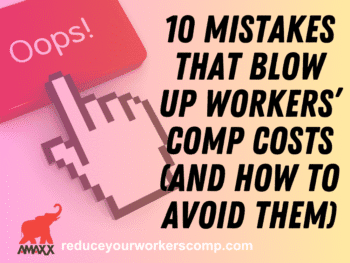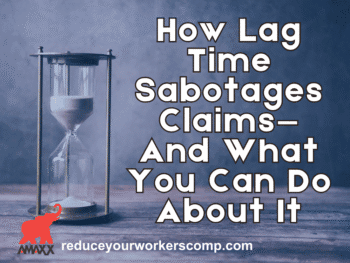In life it is human nature to view events and developments from ones own perspective. The same holds true for employers and employees in their view of workers compensation. Often the way an employer and employee see a particular action or event will differ greatly whether it is dealing with a safety program, a work comp claim or a work comp policy.
Unfortunately, mistrust exists between employers and employees when it comes to workers' compensation. Often, both employers and employees will have dissatisfaction and mistrust of the work comp system, whether it is an industrial commission, workers compensation board or court system. Both employers and employees see the work comp system as having unnecessary delays and unfair policies and procedures. Employers often feel the work comp board mediators or judges are biased against them, especially if the mediator or judge was a former plaintiff's attorney. (WCxKit)
The selection of the medical provider is often a source of mistrust between employers and employees. If the employer selects the doctor for treatment, the employee will worry the doctor is more interested in keeping the insurance company happy then in providing them with complete medical care. If the employee selects the doctor for treatment, the employer is concerned the doctor will keep the employee off work longer than necessary and provide an outrageous disability rating.
Disputes over medical care often results in mistrust between the employer and the employee. For instance, employees who have comorbidity issues like diabetes or obesity often end up in a situation where they do not trust the employer/insurer and the employer/insurer does not trust the employee because it is difficult to separate the medical treatment for their work comp injury from the medical treatment for their preexisting medical condition. The employer or insurer feels like they are paying for medical care that is unrelated to the work comp claim, while the employee feels like the employer or insurer is trying to deny them the medical care they need to recover from their injury.
Employees are skeptical of the intentions of the employer or work comp insurer when they have heard some other employee's work comp claim was denied. Employees often fear they will be fired or incur other retribution for reporting a work comp claim (even though all states have statutes that prevent any form of retaliation for filing a work comp claim).
Employees often feel they are pressured to return to work before they are able, that the insurance company will contest valid medical treatment and they will receive unfavorable treatment from their employer. Employees sometimes think they will be passed over for promotions or receive smaller raises if they report an injury.
Employees will often not report a minor injury as they do not want to deal with what they see as a bureaucracy of the insurance company. Some employers, who also want to cut down on the frequency of reported work comp claims, will encourage employees to submit the claim to their group medical insurance or pay the cost of the medical care themselves. (Both practices are illegal in most jurisdictions and will also result in the insurer terminating the work comp policy when they find out that the employer is not reporting the small claims. When all claims are not reported, it results in the insurer charging an inadequate premium because they do not know the true frequency level).
Employers are skeptical of many work comp claims, especially the work comp injuries that are unwitnessed, have no outwards signs of injury (like back strains and carpal tunnel) or occur on a Monday morning. Employers often question the legitimacy of the claim, especially when the injury claim is reported late after an employee has been disciplined or laid off or is working at a plant/factory that is scheduled to be closed. When employees abuse the work comp system, it not only hurts the employer, it also hurts other employees, as the employer becomes skeptical of employees who file work comp claims.
Fraud, and suspected fraud, cause employers to not trust employees, especially if the employee has a medical condition that seems questionable to the employer. For example, employees who want to save their vacation time, but also want to take a couple of weeks off and claim a back injury or other non-visible injury, also create mistrust with the employer.
Over aggressive employers who want to deny most or all work comp claims because of concern over what their workers compensation insurance is going to cost can create a lot of mistrust by employees. If the employee has heard other employees say “the boss denies every work comp claim”, the employee will mistrust the employer and the insurer, even when they are given no reason to. (WCxKit)
There is no simple solution to the mistrust between employers and employees over workers compensation. The employer can have a positive impact on the trust between the employee and the company by always treating the employee fairly and compassionately. When a work comp decision is made that the employee does not understand or does not agree with, it is in the best interest of the employer to discuss the decision with the employee.
Author Rebecca Shafer, JD, President of Amaxx Risks Solutions, Inc. is a national expert in the field of workers compensation. She is a writer, speaker, and website publisher. Her expertise is working with employers to reduce workers compensation costs, and her clients include airlines, healthcare, printing/publishing, pharmaceuticals, retail, hospitality, and manufacturing. See www.LowerWC.com for more information. Contact: RShafer@ReduceYourWorkersComp.com or 860-553-6604.
WC IQ TEST: http://www.workerscompkit.com/intro/
WORK COMP CALCULATOR: http://www.LowerWC.com/calculator.php
SUBSCRIBE: Workers Comp Resource Center Newsletter
Do not use this information without independent verification. All state laws vary. You should consult with your insurance broker or agent about workers comp issues.
©2011 Amaxx Risk Solutions, Inc. All rights reserved under International Copyright Law. If you would like permission to reprint this material, contact Info@ReduceYourWorkersComp.com
























